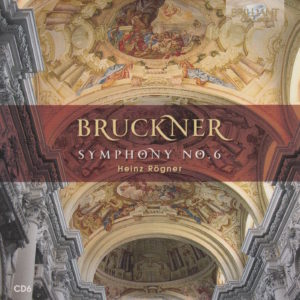 Today is my wife’s birthday. So, here we sit. I’m listening to Bruckner’s Sixth. She’s trying her best to remain positive by saying, “I really do like the person you are, Soulmate.”
Today is my wife’s birthday. So, here we sit. I’m listening to Bruckner’s Sixth. She’s trying her best to remain positive by saying, “I really do like the person you are, Soulmate.”
Sure you do. 🙂
 This morning’s conductor of Anton Bruckner’s Symphony No. 6 in A Major (WAB 106) is Heinz Rogner (1929-2001), who was born in Leipzig, Germany.
This morning’s conductor of Anton Bruckner’s Symphony No. 6 in A Major (WAB 106) is Heinz Rogner (1929-2001), who was born in Leipzig, Germany.
Prior to Day 60, I had never heard a performance conducted by Heinz Rogner.
I heard him again on Day 76.
I’m hearing him again today, on Day 92.
As a reminder, this is from Rogner’s bio on Wikipedia:
From 1958 to 1962, Rögner was chief conductor of the Leipzig Radio Orchestra. From 1973 to 1993, he was chief conductor of the Berlin Radio Symphony Orchestra. In 1984, he became chief conductor of the Yomiuri Nippon Symphony Orchestra, and in 1990 took the title of permanent guest conductor.
Maestro Rogner is part of a box set called Bruckner: Complete Symphonies, which you can buy from Amazon here. I’ve heard other conductors from that set in my 144-day journey.
The great thing about this set is it’s from Brilliant Classics, one of the most affordable, yet high-quality record labels I’ve ever encountered. I have many box sets from Brilliant Classics, mostly because they release complete recordings – as in Complete Bach, Complete Mozart, Complete Beethoven, etc. Their prices are incredibly low compared to what you get in return.
(And I swear Brilliant Classics didn’t pay me to type those words. I’m just passionate about their label.)
On to the facts of today’s recording…
Symphony No. 6 in A Major (WAB 106) composed between 1879 and 1881
Heinz Rogner conducts
Rogner used the “Nowak Version,” according to the CD sleeve. (But the Nowak verion of what? The Original version?)
Rundfunk-Sinfonie-Orchester Berlin plays
The symphony clocks in at 52:17
This was recorded on June 19, 1980 – location unknown (but probably Berlin, Germany)
Rogner was 51 when he conducted it
Bruckner was 57 when he finished composing it
This recording was released on the Brilliant Classics label
Bruckner wrote his symphonies in four parts. The time breakdown of this one (Symphony No. 6 in A Major, ed. Nowak), from this particular conductor (Rogner) and this particular orchestra (Rundfunk-Sinfonie-Orchester) is as follows:
I: Majestoso…………………………………………………………………………………………………….13:48
II: Adagio. Sehr feierlich (Very solemnly)……………………………………………………….15:38
III: Scherzo. Nicht schnell (Not fast) — Trio. Langsam (Slowly)………………………8:03
IV: Finale. Bewegt, doch nicht zu schnell (With motion, but not too fast)……14:34
Total running time: 52:17
From the essay on Symphony No. 6, written by Christiane Krautschied:
No other composer tended to force such passionate outbursts, dramatic build-ups, vast harmonic textures and moments of static rigidity into the time-honoured mould of the symphony – least of all in Vienna, which had been home to the ‘Classical masters’ and now accommodated Beethoven’s legitimate successor, the standard-bearer of the symphonic form, Johannes Brahams!
…The Sixth lacks the vastness of scale and the abrupt juxtaposition of blocks of sound built up to a high pitch of ecstasy, nor does it make full use of all the musical resources available. Instead, Bruckner composed four new movements of which the sunlit slow movement and the airy fantastical scherzo with its chamber music delicacy demonstrate clearly why the composer referred to his Sixth Symphony as the most audacious of them all.
And now for my subjective assessment:
My Rating:
Recording quality: 5 (typical Brilliant Classics fare – crisp, clean, and exciting)
Overall musicianship: 5
CD liner notes: 4 (decent essays on each Bruckner symphony, but little information about the conductors)
How does this make me feel: 5
The first thing I need to mention is that even though the 16-page booklet contains some of the best essays on Bruckner’s symphonies I’ve yet read, it contains virtually no information about the orchestras or the conductors. For Bruckner nerds such as myself that seems like a colossal oversight on Brilliant’s part. Would it have killed them to include another spread in the CD booklet that contained a paragraph or two about each conductor? Or even where (city and or state/country) each symphony was recorded?
It’s possible I’m biased. But I really enjoy recordings from Brilliant Classics. They are uniformly of high quality, not only aurally but also in performance.
This is no exception. I was engaged from the opening notes of Majestoso to the end of the Finale.
So far – with six symphonies from this box set behind me – I can easily say this is one of the best.
“Huzzah!”
